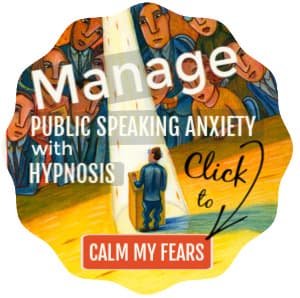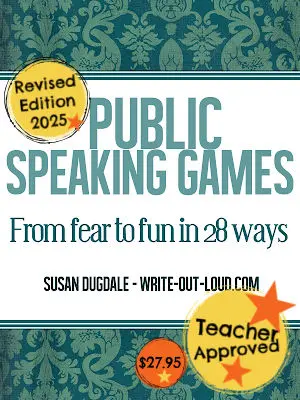- HOME ›
- Speech topics ›
- Easy persuasive speech topics: examples
Easy persuasive speech topics: examples
309 good persuasive topics + resources for writing persuasive speeches
By: Susan Dugdale
Let's be right up front about this.
'Easy' and 'persuasive' are seldom paired when it comes to speech topics! Therefore, examples of easy persuasive speech topics are a bit of a rarity, and finding them can be tricky.
However, all is not completely lost. They can, and do, come together, but only if you work at it. Let me show you how.
What's on this page
- 309 potentially easy persuasive speech topics
- the myth of 'easy' and an 'easy speech'
- what makes a successful persuasive speech
- how a persuasive speech topic can become easy
- additional persuasive speech resources
The myth of 'easy' and an 'easy' speech
That word 'easy' is so very tempting. It seductively implies something you can fling together, without a lot of effort, at short notice.

An 'easy' persuasive speech is not going to take a lot of work to plan, research, to write, or to practice. Everything needed to prepare it will be done without hassle, because it's, 'easy'. The entire process will flow smoothly from start to finish without fuss.
When you present the speech, the audience will be spell-bound, riveted by your outstanding choice of subject and its treatment. In short, they will be amazed. Gob smacked*, and 100% persuaded!
*astounded, overwhelmed.
What a successful persuasive speech usually takes
To give a successful persuasive speech means being able to use a compelling mix of reasoning and emotional appeal to convince whoever you are talking to that your point of view is right or at least, worth considering. Generally doing that well takes thought and effort.
You need to have chosen a subject your audience will be genuinely interested in and to use just the right combination of logical reasoning and emotional appeal to engage and hold them from the first words you say till your last. That in turn means thinking your speech through carefully, step by step, and then doing whatever is needed to make it work.
Those things include:
- deciding on a specific speech purpose, (what you want people to do as a result of listening to your speech)
- research to pull facts together to ground your speech, to give you a solid platform to build your speech on
- understanding your audience so you know how best to shape your material to address their concerns
- sorting out any additional resources you may want to use (e.g. images, graphs, handouts ...)
- practice, and then more practice.
You, see? Easy and persuasive don't seem to have a lot in common.
However, there is a way through.
How a persuasive speech topic becomes easy
You'll be glad to know there are exceptions.
A persuasive topic becomes 'easy' if:
- it fits with the criteria you've been given,
- you already know a lot about it,
- there's a readily accessible, and credible body of knowledge covering it,
- you're passionate about it, and
- you genuinely want to do what is required to do it well.
Difficulties miraculously melt away when you are totally engrossed!
309 potentially easy persuasive speech topics
Below are 309 good persuasive topics chosen for their broad appeal, and because they are subjects people generally feel strongly about.
- 69 topics based on education
- 135 based on aspects of health: mental health, the psychology of motivation, autism, natural medicine, the dangers of alternative medicine, current medical issues
- 21 food themed persuasive speech topics
- 53 topics based on ethics, morals and values
- 20 economy themed topics
Read them through, making a note of any that jump out and that you think you may be able to use. These will be the ones you'll find much 'easier' than the others because you're already interested!
69 persuasive speech topics on education
Put a group of people together who share concerns about the direction society seems to be headed and it won't be long before the hot topic under discussion is education!
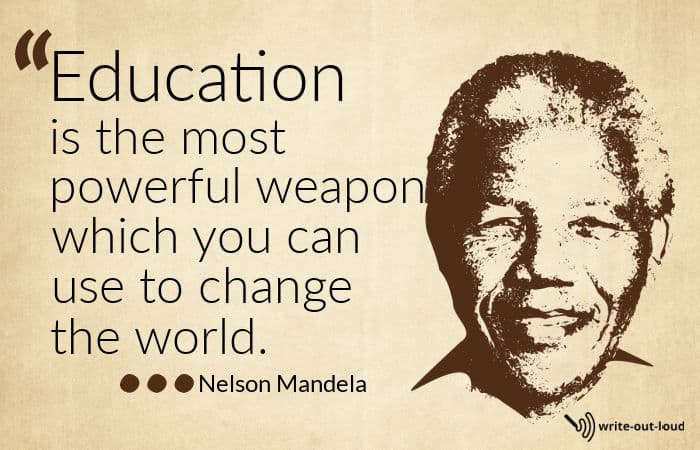
- that there is no such thing as the best form of education
- that some types of education are a waste of time and resources
- that all education should be free
- that education should be paid for by those who want or use it
- that schools should provide experienced specialist support teachers to meet the needs of all their pupils
- that no child should be denied an education on the grounds of gender, race, poverty or the legal status of their parents
- that online learning can never replace real-time and place class room learning
- that competition with other students is a necessary part of education
- that different learning styles need to be to be taken into account by teachers
- that a student who drops out of school has been failed by the school system
- that the problems created by illiteracy are bigger than we think
- that society benefits from promoting gender equality and women's empowerment through education
- that it is vital to teach media literacy to combat fake news and misinformation
- that scholarships for those who need them should be increased
- that a college education is not the right choice for everyone
- that private schools support elitism
- that the advantages of project-based learning far outweigh the disadvantages
- that having a bilingual education is an advantage in a globalized world
- that a good education is the passport to a better life
- that a school uniform helps make everyone equal
- that schools need to systematically teach critical thinking and problem-solving skills
- that teachers should be held responsible for the performance of their students
- that the students of a teacher who is enthusiastic about their topic will always achieve better grades
- that textbooks, and other school supplies, should be provided free of charge to those who need them
- that there needs to a comprehensive education program on consent and sexual assault prevention in schools
- that life skills, (how to cook, how to budget and manage money effectively, how to shop economically, how to garden...) should be taught in schools
- that making some school subjects compulsory should be abolished
- that coding and computer science should be taught from an early age
- that taking a gap year should be encouraged
- that an arts education fosters creativity and critical thinking
- that alternative forms of education should be encouraged, and supported
- that teachers should be thoroughly background checked
- that teachers should have to pass a regular 'fitness to teach' test
- that the school leaving age should be raised
- that students should not be forced to take classes they do not want to
- that there are significant advantages for using technology in the classroom
- that school violence is a mirror of the society we live in
- that students who take part in protests are actively learning about their rights and responsibilities
- that grades do not reflect intelligence
- that truancy is powerful comment on the relevancy of schools
- that homework, for homework's sake, should be banned
- that residential segregation has a direct impact on the quality of education students receive
- that prestigious schools maintain their prestige through only admitting students who are likely to succeed
- that schools should focus on the core subjects: reading, writing and arithmetic
- that parents should be far more involved in their children's education
- that a person who is homeschooled is not disadvantaged
- that far too much importance is placed on IQ tests
- that corporal punishment should never be used
- that meditation and other forms of mindfulness should be taught in schools
- that single sex schools are better for girls
- that intelligence is more than quick accurate recall and clever problem solving
- that a holistic education is best
- that an education should be a right, not a privilege
- that it is important to teach students about empathy and emotional intelligence
- that no girl should ever be barred from school because she is pregnant
- that there is no 'right, one way' to educate a child
- that bullying, in any form, by anyone, should be addressed immediately and appropriately
- that students need to be taught how to handle social media responsibly
- that the arts are equally as valuable as the sciences
- that an old-fashioned school curriculum teaches respect and values
- that it is advantageous to learn at least one other language, in addition to your mother tongue
- that the foundation of all education is laid down in the home
- that civics and ethics should be core subjects
- that extracurricular activities are an essential part of a well-rounded education
- that cheating on a test or in an examination is understandable
- that community service should be an essential part of education
- that financial education is essential and should be taught to all students in all schools
- that guns should never be taken to school
- that getting top marks in an examination is not the only way to prove a person’s intelligence
135 persuasive speech topics about health
Health, according to the World Health Organization, is "a state of complete physical, mental and social well-being and not merely the absence of disease and infirmity." It's a huge topic! And that is an understatement!
46 mental health persuasive speech topics
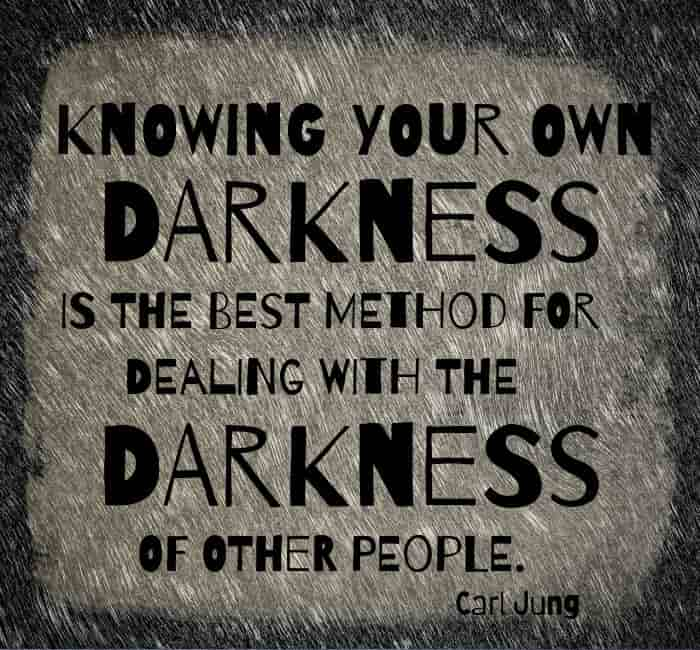
- that mental health should be taken more seriously by general health practitioners
- that mental health should be discussed in schools
- that mental health and physical health are interdependent
- that early intervention is important to prevent long-term mental health problems
- that good mental health begins with a good diet
- that being 'mad' does not mean a person is 'bad'
- that a person can learn to become more mentally resilient
- that to be vulnerable is to be strong
- that laughter heals
- that how the media portrays mental health issues influences public perception for better and for worse
- that mental health issues are passed down from generation to generation
- that mental health issues can unnecessarily limit what people choose to do with their lives
- that poverty and homelessness underpin many mental health issues
- that we need mental health screenings and regular check-ups to monitor our overall well-being
- that prolonged lack of sleep can cause mental health concerns
- that religious practices and beliefs can contribute to mental health problems
- that anxiety and depression need to be more widely understood
- that sticks and stones will break my bones, but names will never hurt me is a lie.
- that vacations are essential for good mental health
- that learning to live with mental health is very different from suffering from it
- that acknowledging our own struggles with mental health makes it easier to understand other people's
- that teachers need training to recognize symptoms of possible mental health issues in their students
- that there is a direct link between physical exercise and mental health
- that substance abuse can mask mental health issues
- that green environments promote good mental health
- that bullying can have serious consequences
- that the real reason a bully bullies is never the person who is being bullied by them
- that the impact of chronic pain on mental health needs to be more widely understood
- that negative self-worth beliefs are reflected in mental health problems
- that treatment for mental health issues should be fully integrated with any other health service providers
- that loneliness and isolation are often factors in mental health concerns
- that cultural difference can underpin mental health issues
- that being mentally unwell is not a sign of weakness
- that shaming a person for needing treatment for mental illness is both cruel and ignorant behavior
- that regular doom-scrolling significantly impacts on a person's mental health
- that overlooking symptoms of mental health problems is dangerous
- the pressure to 'fit in', to conform and to become someone else's idea of who you should be is unhealthy
- that seeking help for mental health concerns is a positive proactive thing to do
- that taking responsibility for our own mental wellbeing is vital
- that to be a little bit crazy is a good thing
- that understanding the cyclical link between addictive behaviors and mental health issues is critical to providing solutions
- that how we talk to ourselves, about ourselves, influences our state of mind
- that self-care and self-compassion are important for maintaining good mental health
- that the adverse impact of traumatic events on mental health is often ignored or underestimated
- that strategies for recovery from trauma and ongoing resilience should be taught in schools
- that peer support groups and community networks are an important part of a person's recovery because they provide a sense of belonging and support
For 50 more mental health persuasive speech topics
24 persuasive ideas: the psychology of motivation
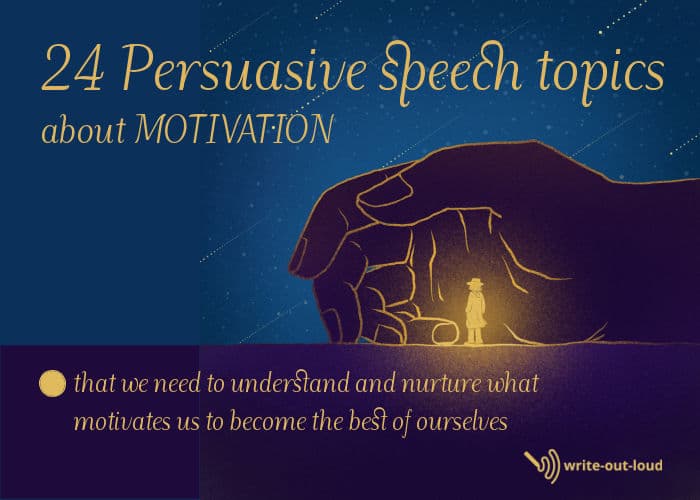
Why do people behave the way they do?
What makes one person deliriously happy when they're in front of a large group of people telling them what to do and another person, utterly miserable?
Why do some people absolutely have to have the latest widget-wodget? And why do others not think about widget-wodgets at all?
The answers are found in motivation.
Motivation is the driving force behind our behavior. It provides the explanation for what we do.
- that personal success is motivating
- that envy is a powerful motivator
- that 'Fear of Missing Out' (FOMO) motivates/influences people to do things regardless of whether they really want to or not
- that seeing success in significant others gives people the motivation to make positive changes
- that finding out what motivates a person at a fundamental level is key to persuading them to follow a certain course of action
- that social media is responsible for motivating people to strive for the unattainable
- that carefully selected strategies for motivating students lead them to excel in their studies.
- that fear of failure motivates many people
- that the desire to be better than others, and to be seen to be better, is a powerful motivator for many people
- that money makes the world go round: the need and desire for money motivates how we behave
- that desire for public recognition and acknowledgment is a powerful motivating force
- that the possibility and promise of becoming famous and powerful can motivate all sorts of extreme behavior
- that knowing what you do is helpful, useful, and kind is motivating
- that mindfulness practices increase personal motivation
- that the desire to understand a particular process or to solve a specific problem is the motivation behind most innovative developments and inventions
- that setting inspiring yet realistic goals motivate a person to strive to reach them
- that fear of consequences motivates people to continue to do what they would rather not
- that curiosity motivates exploration and experimentation
- that being motivated by the acquisition of material rewards, wealth and possessions, will ultimately not be enough
- that fear and anxiety motivate aggression
- that serving your community the best way you can is motivating
- that positive self-talk increases and sustains motivation
- that people are happiest and most creative when they motivated by what they are passionate about
- that being genuinely and sincerely proud of oneself is motivation to keep ourselves on track
- that we need to understand and nurture what motivates us to become the best of ourselves
For more information: Motivation and What Really Drives Human Behavior (positivepsychology.com)
10 persuasive speech topics about autism
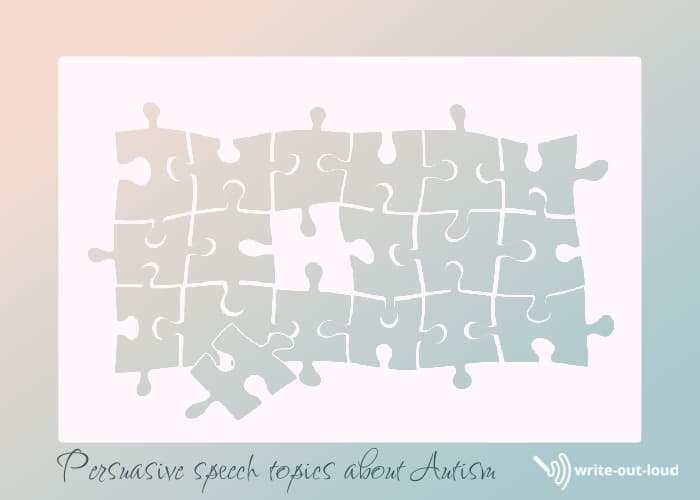
Autism, or autism spectrum disorder (ASD), refers to a broad range of mild to severe conditions characterized by challenges with social skills, repetitive behaviors, speech and nonverbal communication. A recent (2020) study revealed that 1 in 36 children (2.7%) in USA have been diagnosed with the disorder. And that number is increasing.
- that promoting autism awareness matters and makes a difference
- that early intervention and treatment is important
- that education for students with autism should be inclusive and supportive
- that the myths and stereotypes about autism need challenging
- that inclusive hiring practices and workplace accommodations are beneficial for everyone: employers and employees.
- that families affected by autism need accessible resources, services, and support systems.
- that technology plays an important role in enhancing communication for nonverbal individuals with autism.
- that ongoing research, and funding, is required to improve understanding and treatment options.
- that there needs to be a holistic approach to autism care.
- that individuals on autism spectrum have value and strengths just like any other person.
19 persuasive speech topics on natural medicine
The term 'natural medicine' is one of several used interchangeably to describe any medical product or practice that is not standard (conventional) medical care.
Other synonyms are:
- alternative medicine or therapies,
- holistic medicine which implies taking into account the 'whole' person rather than focusing on and treating isolated symptoms,
- herbal (plant based) remedies and,
- complementary medicine: a treatment regime that includes elements of conventional and alternative medical care.
'Natural medicine' polarizes people. There are those who are vehemently against any form of it and who will not consider any treatment other than what is current standard medical practice. Then there are those who resolutely choose alternative options. Either way, it's a fascinating field!

- that traditional herbal remedies effectively treat common ailments
- that acupuncture is beneficial for pain management
- that practicing meditation and mindfulness improves mental health
- that chiropractic treatments effectively relieve back and neck pain
- that yoga supports physical and mental wellness
- that naturopathy should be used as a complementary approach to conventional medicine.
- that homeopathy is effective in treating chronic illnesses.
- that aromatherapy can relieve stress and enhance relaxation.
- that traditional Chinese medicine should be incorporated into modern healthcare.
- that good nutrition prevents disease
- that massage therapy promotes physical and mental well-being.
- that energy healing treatments like Reiki and acupuncture work well
- that CBD (cannabidiol) oil helps people effectively manage pain and anxiety.
- that the advantages of integrative medicine: combining conventional and alternative approaches should not be underestimated
- that herbal supplements support good immune system health.
- that holistic Ayurvedic medicine and practices are proven and promote wellness.
- that the common myths about alternative health care and its potential harms are overstated
- that acupuncture is an effective fertility treatment
- that hypnotherapy is an effective treatment for public speaking fear, smoking cessation, weight loss, and more...
14 persuasive speech topics on the possible dangers of using alternative medicine
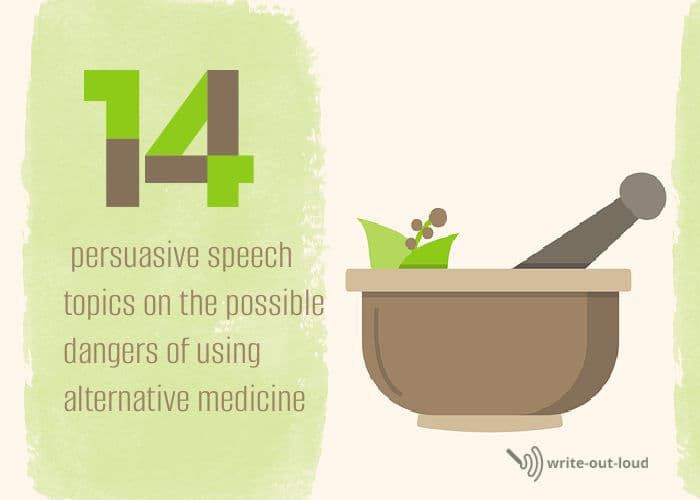
- that there are hidden risks in using unregulated alternative health care practices
- that there are potential dangers in relying solely on alternative health care for serious medical conditions
- that there are risks in self-diagnosis and self-treatment with alternative health care
- that misinformation is a problem in alternative health care practices
- that there are potential adverse effects with unproven alternative health care treatments
- that there are hidden financial risks with alternative health care therapies
- that evidence-based medicine is more reliable than alternative health care approaches
- that we need to protect vulnerable people from the dangers of untested alternative health care remedies
- that unqualified practitioners in alternative health care fields can cause harm
- that relying on unverified testimonials and anecdotal evidence in alternative health care is dangerous
- that there are risks of negative interactions with conventional medications while using alternative health care treatments
- that unregulated supplements and herbal remedies in alternative health care could be dangerous
- that alternative health care therapies for incurable diseases promote false hopes
- that informed consent and transparency in alternative health care practices is important
22 current medical issues speech topics
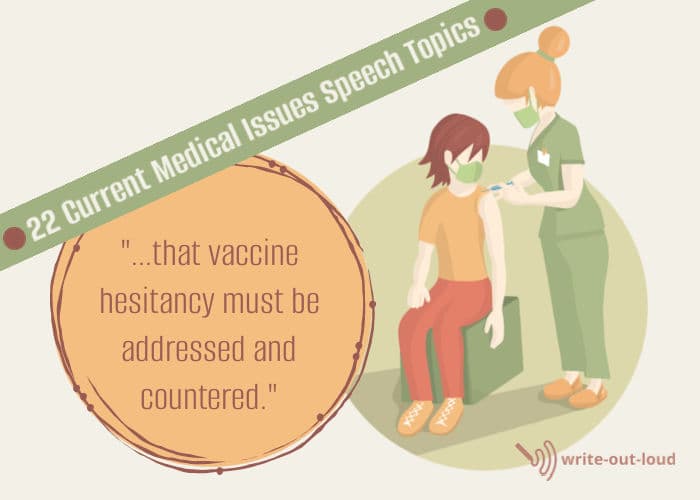
- that vaccine hesitancy must be addressed and countered
- that stigmas around mental health must be challenged
- that good accessible mental health care should be available for all
- that cosmetic and reconstructive surgery should only be for those who genuinely need it
- that comprehensive specialized mental health programs and support systems need to in schools
- that the lessons for the opioid crisis must be learned
- that inequal access to medical services needs addressing
- that the balance between patient autonomy and a physician's responsibility needs careful monitoring
- that strategies for promoting healthy aging and elderly care are essential with an aging population
- that organ donation needs to be actively encouraged to overcome the shortage of organs available for transplantation
- that the ethical implications of genetic testing need careful consideration
- that healthy active lifestyles must be promoted to combat childhood obesity and the obesity epidemic
- that the increasing role of technology in healthcare presents as many innovations as it does challenges
- that pharmaceutical drugs need to be accessible and affordably priced
- that the impact of social media on body image need to be countered by actively promoting positive self-perception
- that developing countries need support to improve health care infrastructure and access
- that precision medicine or personalized healthcare has better patient outcomes
- that we should encourage conversations about end-of-life care before the need for it arises
- that the legal and ethical concerns about euthanasia and assisted suicide can be humanely and respectfully resolved
- that the use of Artificial Intelligence (AI) in medicine presents great opportunities as well as challenges
- that improving obstetric care would lower maternal mortality rates
- that for the good of the health of the mother, abortion on demand should be legal
- that all tobacco products should be banned
- that the use of medical marijuana by patients in hospitals needs careful consideration from a legal standpoint
21 food themed persuasive speech topics
The subject of food: its cultivation, preparation, scarcity or abundance, generates passionate debate regardless of who we are, or where we are on the planet.
Have fun with these!
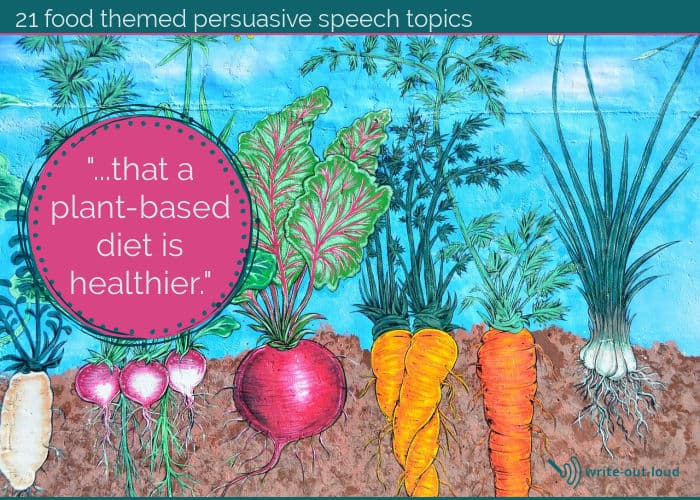
- that poor nutritional health in first world countries is the result of poor food choices
- that the use of unsustainably produced palm oil in food and other products should be banned
- that the benefits of eating locally sourced food outweigh the disadvantages
- that we must reduce food waste to lessen its environmental impact
- that eating fast food long-term is dangerous
- that a plant-based diet is healthier
- that the negative effects of genetically modified organisms (GMOs) in our food system outstrip their shorter term benefits
- that organic farming has positive effects on health and the environment
- that nutrition education in schools helps combat childhood obesity
- that a sugar tax would help control the consumption of foods with high sugar content
- that factory farming is unethical
- that we need to adopt humane animal welfare practices
- that advertising and marketing of unhealthy food choices makes them attractive
- that food safety and strictly enforced regulations are necessary for public health
- that food waste should be against the law
- that food deserts (areas that have limited access to affordable and nutritious food) have an enormous impact on the health of communities
- that there are workable, sustainable, affordable strategies to combat the effects of food deserts and food insecurity
- that the food we eat effects our mental as well as our physical health
- that producing food sustainably helps combat climate change
- that there are significant health risks associated artificial food additives and preservatives
- that genetically modified foods must be labeled for consumer awareness
53 topics: ethics, morals and values
The words 'ethics', 'morals' and 'values' are frequently interchanged as if they mean the same thing. However, although there is considerable overlap between them, they don't.

Values are the core beliefs on which we center and base our lives. They are the values we have decided are important and can be personal as well as shared. Examples are honesty, service, cooperation, family, heritage, freedom of expression, independence, privacy, loyalty, integrity, or success.
Morals are based on our values. They elicit feeling or emotional responses in us. For instance, we feel good when we behave in accordance with our values, and bad when we don't. Like values, our moral codes can be either personal or shared.
For example: if one of our core values is the importance of family, then we will feel guilty and uncomfortable if we don't honor it. We make a moral judgment about our own behavior.
Ethics: These let us know what is right and wrong. For instance, many professions have a code of ethics to regulate the behavior of their members. Examples are medical practitioners, lawyers, and teachers. They are rules based on a shared moral code as are the laws governing how we function as a society.
Because life and people's experience of it, is not static, values, morals and ethics can change over time. And although there are some behaviors that have generally always been unlawful, (murder, fraud, infanticide...), what was acceptable and normal once, does not guarantee its rightness now.
For a fuller explanation please see this excellent article: What's the Difference Between Ethics, Morals and Values?
28 topics based on morals and ethics
- that there are major ethical implications of the role of artificial intelligence in our daily lives
- that the unmonitored use of facial recognition technology is a violation of individual rights
- that corporations have a moral responsibility to address climate change
- that war is never right ethically or morally
- that the ethics of genetic engineering and its impact on society need careful monitoring
- that it is important to fully consider the ethics in the development and use of emerging technologies like blockchain and cryptocurrency need
- that the ethical challenges of data privacy and protection in the digital age must be met for the safety and security of society
- that the ethical implications of using animals for scientific research requires regular reviewing
- that the ethical and moral implications of our current abortion laws need thorough and careful investigation
- that the ethics of capital punishment need scrutinizing. Is it ever morally justifiable?
- that the ethical implications and long-term impact of gene editing and designer babies need careful consideration
- that it is no longer either ethical or moral to differentiate salaries or workplace benefits on the basis of gender
- that the moral obligations of healthcare professionals in end-of-life decisions need to be fully considered
- that whistleblowing is an ethical way of ensuring corporate accountability
- that the use of drones and autonomous weapons demands a thorough review of the ethical considerations involved
- that an individual has the right to choose their own death. The moral dilemma of euthanasia, if there is one, is their own to solve.
- that the ethical implications of the long-term impacts of genetic testing and personalized medicine need to be thoroughly investigated
- that social media platforms have ethical responsibilities in combating the spread of online harassment and misinformation
- that the moral issues surrounding the use of performance-enhancing drugs in sports need to examined calmly and carefully
- that the ethics of factory farming and its impact on animal welfare need to be thoroughly and regularly reviewed
- that the ethical and moral implication of discriminatory adoption laws should be investigated
- that the ethics and impact of online advertising should be independently monitored
- that the ethical considerations in the allocation of healthcare resources should always play a major role in decision making
- that the moral implications of genetic cloning and its potential consequences will force our governing bodies to legislate against it
- that the ethics of global wealth distribution and poverty alleviation will always be in question while inequality exists
- that the ethical challenges of conducting research on human subjects is entirely justifiable
- that internet censorship is both sensible and ethical
- that it is ethical and morally responsible that children should have their use of social media and the internet monitored.
25 persuasive speech topic ideas on values

- that we must never tell lies to children except about Father Christmas, the Tooth Fairy and the Easter Rabbit
- that honesty in personal and professional relationships is best at all times
- that embracing diversity is essential for a harmonious society
- that team sports build good character traits
- that empathy, (compassion and understanding), has the power to change lives
- that education is fundamental for personal growth and the progress of society
- that privacy and the protection of personal information matters more than ever
- that everybody is entitled to privacy, including children and teenagers
- that taking personal responsibility and promoting sustainability for our planet's environment is vital for our and its survival
- that actively advocating for gender, racial and social justice promotes equality
- that life was better before the influence of online social media took over
- that everyone should spend several months per year working for the betterment of others in a non-profit social service organization
- that regular acts of kindness and goodwill make a positive impact no matter how small
- that everyone should spend several months per year working for the betterment of others in a non-profit social service organization
- that becoming self-aware increases our emotional intelligence, which in turn, improves our relationships with others
- that the lives of all living creatures should be valued and protected
- that we need to celebrate, tolerate and accept differences in beliefs, cultures and lifestyles
- that expressing oneself freely is more important than getting the grammar, punctuation and spelling right
- that integrity, honoring moral principles, in personal and professional settings, builds trust and respect
- that cooperation, volunteering and civic engagement builds strong healthy communities
- that everybody should learn to cook and clean for themselves
- that we need to value, understand and learn from our history
- that genuinely and sincerely acknowledging and apologizing for hurtful, damaging behavior promotes healing and encourages transformation
- that it is better to earn your own living rather than to be financially provided for by someone else
- that money is not a meaningful measure of success
20 persuasive speech topics about the economy
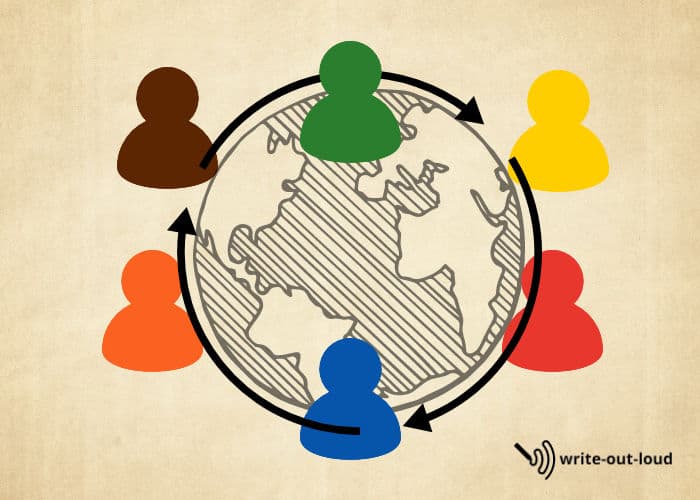
What is an 'economy'? What does the word mean? I hear and read it frequently and its often in different contexts.
For example, at my local grocery store there's a large sign telling me that buying 10 cakes of soap at a never to be repeated discounted rate of 33% off per cake is good economy.
On the news I hear that our economy is challenging. There have been significant rises in the price of food over the past six months and mortgage rates are set to increase.
That's two different uses. The first is implying that buying in bulk will save me money. The second suggests it refers to the ebb and flow of monetary exchange for goods and services in society.
I sought a definition for clarity and found this:
"An economy is a complex system of interrelated production, consumption, and exchange activities that ultimately determines how resources are allocated among all the participants. The production, consumption, and distribution of goods and services combine to fulfill the needs of those living and operating within the economy.
An economy may represent a nation, a region, a single industry, or even a family."
For more information: Economy: What It Is, Types of Economies, Economic Indicators (investopedia.com)
This definition covers the dynamic interconnecting web of exchanges for goods and services underpinning our daily lives, and that is the focus of the topics below.
- that promoting entrepreneurship for economic growth has benefits
- that investing in renewable energy for a sustainable economy is important
- that there are both advantages and disadvantages of globalization on national economies
- that the impact of automation on employment requires carefully thought through strategies for economic adaptation.
- that multinational corporations need stricter regulations
- that increasing the minimum wage to improve income equality benefits everyone
- that the advantages of a universal basic income for economic stability outweigh its disadvantages
- that government should play an active role in fostering innovation and technological advancements
- that financial literacy education benefits both individuals and the economy
- that promoting fair trade practices benefits developing economies
- that income inequality impacts on social stability and economic growth
- that free trade agreements have significant advantages
- that investing in infrastructure for economic development is important
- that implementing sustainable economic policies has benefits for long-term growth
- that government has a role in reducing poverty and income disparities
- that immigration and inclusive immigration policies have a positive impact on the economy
- that the advantages of austerity measures during economic crises outweigh the disadvantages
- that promoting small businesses is important for local economic development
- that investing in education and skills training benefits economic competitiveness
- that technology transforms traditional industries and creates new economic opportunities

More persuasive speech resources
Persuasive speech topics

- 105 fun persuasive speech topics: ideal for light-hearted, informal speeches
- 100 non-boring persuasive speech ideas - a 'tired' topic is not for you. Choose something fresh and original.
- 50 good persuasive speech topics with treatment examples to show you how the same topic is treated differently for different audiences.
- 310 persuasive speech topics for college: mental health, society, family & friends, animals, education
- 108 feminist persuasive speech topics: the top current women's rights & feminist issues
For assistance with planning and writing
- Writing a persuasive speech - a 7 step action plan that includes how to choose a topic, analyze your audience, set a good speech purpose, decide on a structural pattern (with examples) and, more.
- A persuasive speech outline example using the 5 step structural pattern: Monroe's Motivated Sequence. (With a free printable outline)
- A persuasive speech example using Monroe's Motivated Sequence

